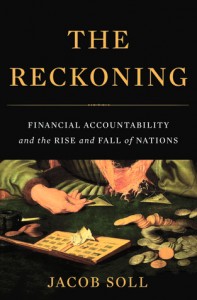 From Dante’s Inferno to Monty Python’s Flying Circus, accounting has often had a bad name. The Reckoning by Jacob Soll goes a long way towards redeeming it, showing how financial accountability has been at the heart of the rise and fall of nations from Renaissance Italy to the present day.
From Dante’s Inferno to Monty Python’s Flying Circus, accounting has often had a bad name. The Reckoning by Jacob Soll goes a long way towards redeeming it, showing how financial accountability has been at the heart of the rise and fall of nations from Renaissance Italy to the present day.
A history of accounting may not sound like an exciting read, but Soll spares us the details of double-entry bookkeeping and instead tells a series of engaging stories of well-known historical events like the French Revolution and the Industrial Revolution, and the not so well-known ministers, merchants and clerks who were balancing the books (or not) behind the scenes.
“Follow the money” is usually a fruitful approach, whether in historical analysis or contemporary politics, and it proves to be here. We see the financial chaos behind the splendour of Louis XIV’s court and the failed attempts to introduce accountability. We learn how the Dutch commercial success had its roots in the nation’s unusual topography: being largely below sea level, it relied on an elaborate system of dikes and drainage channels, none of which could be maintained without careful administration and regular, open audits to maintain public trust.
The narrative is particularly strong when Soll is charting the early growth of accounting in Renaissance Florence, a natural outgrowth of the personal systems used by bankers and merchants. He shows us how the Medici rulers used accounting to cement their power, and mixes in some beautiful descriptive language:
Florence is an odd city. In the right light, with dry air in a late afternoon, there is no more beautiful place on earth. The heavy stones give off a rosy hue, and its mixture of humidity and dryness can, on a hazy day, make the city seem like it is floating up to the glorious hills that surround it, to the earthly paradise of Fiesole.
In some cases, the effort to place accounting at the centre of political successes and failures goes too far. Soll’s basic thesis is that successful nations have strong accountability, and it’s usually when those standards start to slip that the nation goes into decline. He chooses his examples well, and they support the thesis so neatly that the effect becomes slightly repetitive – a ruler achieves success by instituting rigorous accounting policies, and then loses power when the audits get sloppy. History, of course, is rarely so neat.
Given the book’s broad historical sweep and Soll’s desire to tell engaging stories, there are naturally plenty of gaps. This is not a comprehensive survey of all nations and regimes, and nor does it pretend to be. But whenever you get a series of vignettes arranged to support a thesis, it’s worth asking whether the thesis would have been supported if different examples had been chosen.
It’s easy to think of examples where the link between good accounting practice and successful statecraft doesn’t hold. Nazi Germany, for example, kept meticulous records, financial and otherwise, but that didn’t prevent the “Thousand Year Reich” from falling after a little over a decade. As for the British Empire, Soll touches on the role of accounting in its rise, but says little about its decline. Britain’s accounting was just as rigorous in the 20th century as it had been at the height of empire, and yet it was powerless to hold things together.
Which leads us to the U.S. and the present day. Occasional scandals aside, the U.S. has a very comprehensive and well audited system of public and private accounts. The government’s books are carefully recorded, and open to the public to inspect, as are those of all the companies listed on the stock exchange. None of this has stopped the nation from sliding into a massive national debt, a debt so large and increasing so quickly that it seems impossible that it will ever be repaid. The U.S. is different from countries like Greece and Argentina only in that it has power. It’s simply “too big to fail”. At least, for now.
It begs the question, for me, of whether accounting really plays such a central role. What if everything is recorded accurately, but the obvious lessons are ignored? What if the U.S., like the British Empire before it, simply ends up documenting its own demise in rigorous detail?
I would have liked to see more in this book on events in the contemporary world, but the last chapter rushes through from the Wall Street Crash to the Enron scandal in such a whirl that it’s hard to draw too many conclusions. Soll is a historian, however, and so it’s unfair to criticise him for focusing on history. I’d strongly recommend this book for the fresh insight it brings to familiar historical events, and for its author’s ability to find the compelling human stories in the dry world of income statements and balance sheets.




There are 6 comments
Great commentary on this one Andrew.
Books like this seem to cover unusually subjects, but I find that they can tell us so much about how the world works. To my chagrin my involved moderate amount of accounting which I found to be painful. However it really is such an important part of how things happen in the world.
Great point about the dangers of documenting one’s own fall.
You’re right, Brian, you can learn a lot about the world from books like this, which take an unusual slant on historical events. Sorry the accounting brought up painful memories for you!
Accounting is something I’ve struggled to escape (dad does it, sister does it, I almost did it, now I work for a company that does it…) so I think this is definitely a book my family need to embrace (we’re all History nerds too).
Sounds as if it’s made for you, Alice!
Wonderful review, Andrew! It is interesting that the author takes a supposedly dry subject and makes it fascinating. I loved that passage about Florence. I liked very much what you said about how good accounting practices may not be enough for a country to be great or successful, if the obvious lessons are ignored. The point about being too big to fail always makes me shudder. It makes me think what happens if it did. It will be like the fall of the Roman empire. I hope I am not around to see it.
It does take skill to bring the interest out of a dry subject, doesn’t it? I thought he did an excellent job of that. The trouble with the “too big to fail” argument is that it tends to perpetuate problems. It’s one of Soll’s points, actually – if there’s no accountability, problems get out of hand. If the U.S. knows it will never have to pay the money back, then it will keep borrowing more and more. I tend to favour an approach that deals with problems up-front, although you’re right that it would not be pretty.